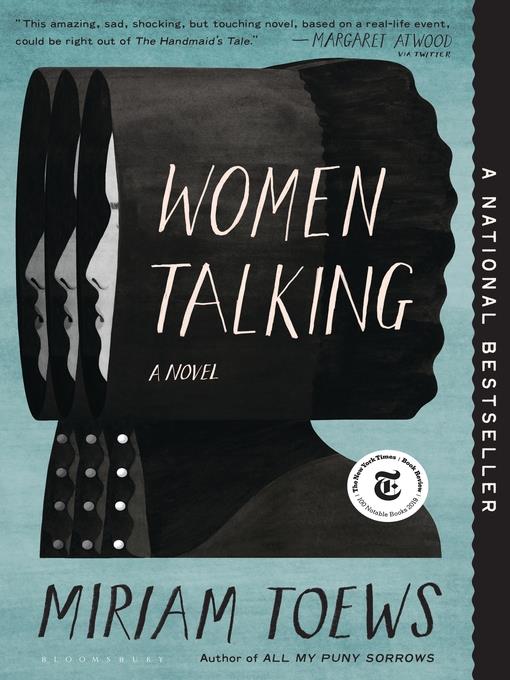
Women Talking
کتاب های مرتبط
- اطلاعات
- نقد و بررسی
- دیدگاه کاربران
نقد و بررسی

Starred review from January 1, 2019
An exquisite critique of patriarchal culture from the author of All My Puny Sorrows (2014).The Molotschna Colony is a fundamentalist Mennonite community in South America. For a period of years, almost all the women and girls have awakened to find themselves bloodied and bruised, with no memories of what might have happened in the night. At first, they assumed that, in their weakness, they were attracting demons to their beds. Then they learn that, in fact, they have been drugged and raped repeatedly by men of the colony. It's only when one woman, Salome, attacks the accused that outside authorities are called--for the men's protection. While the rest of the men are away in the city, arranging for bail, a group of women gather to decide how they will live after this monstrous betrayal. The title means what it says: This novel is an account of two days of discussion, and it is riveting and revelatory. The cast of characters is small, confined to two families, but it includes teenage girls and grandmothers and an assortment of women in between. The youngest form an almost indistinguishable dyad, but the others emerge from the formlessness their culture tries to enforce through behavior, dress, and hairstyle as real and vividly compelling characters. Shocked by the abuse they have endured at the hands of the men to whom they are supposed to entrust not only their bodies, but also their souls, these women embark on a conversation that encompasses all the big questions of Christian theology and Western philosophy--a ladies-only Council of Nicea, Plato's Symposium with instant coffee instead of wine. This surely is not the first time that these women are thinking for themselves, but it might be the first time they are questioning the male-dominated system that endangered them and their children, and it is clearly the first time they are working through the practical ramifications of what they know and what they truly believe. It's true that the narrator is a man, but that's of necessity. These women are illiterate and therefore incapable of recording their thoughts without his sympathetic assistance.Stunningly original and altogether arresting.
COPYRIGHT(2019) Kirkus Reviews, ALL RIGHTS RESERVED.

Starred review from November 15, 2018
They have to meet in secret, and time is tight. They are grandmothers, mothers, sisters, and daughters in the Molotschna Colony, a Mennonite community in an unnamed, Spanish-speaking country. These girls and women have been attacked and raped. The bishop declared it the work of ghosts and demons and suggested that the women were being punished for their sins. Or perhaps they'd just imagined it, injuries notwithstanding. But the truth has finally emerged: the rapists are colony men. Husbands, fathers, brothers, and sons who snuck into the women's rooms at night, drugged them with an animal anesthetic, and beat and raped them, even assaulting a three-year-old girl. The women are traumatized and afflicted by a sexually transmitted disease (there's no medicine to treat it), forced pregnancies, and the suicide of one rape victim's mother. Some men are in jail; others are in town raising their bail. The women have been given an ultimatum: forgive the rapists and go to heaven, or forfeit salvation and leave the colony, the only world they know. Eight courageous women gather clandestinely in a hayloft to decide their future. Canadian author Toews, whose six previous best-selling novels include All My Puny Sorrows (2014), grew up in a Mennonite community, and Mennonite life permeates her fiction. This sharp blade of a novel was inspired by actual events in a Mennonite colony in Bolivia. Although their way of life, with horses and buggies, creates the ambience of several centuries past, the assaults took place between 2005 and 2009, making them all the more appalling. Toews' eviscerating fictionalization of this incendiary reality focuses not on the violence but, rather, on the keen, subversive intelligence of the Mennonite women, their philosophical casts of mind, clashing personalities, and deep concerns about family and faith. Toews' choice of narrator is also counterintuitive. August Epp is the colony's schoolteacher. The son of progressive, excommunicated parents, he has returned after a rather disastrous stay in London because of his love for Ona, one of the brave rebels meeting in the hayloft to discuss their options. While the colony's men mock August as effeminate, the women trust him so much they've asked him to take minutes so that there will be a record of their debate. The women's predicament is complicated by the fact that they speak Plautdietsch, a medieval language now only known to Mennonites, and they cannot read or write. But they are incisive, eloquent, passionate, and caustically funny. August can hardly keep up with their nuanced yet rapidly deployed arguments, insults, jokes, stories, and analyses of the possible consequences of their difficult choices. Temperamental and generational differences emerge, as do degrees of fury, pain, and determination. The women talk, one man listens, and readers read wide-eyed as Toews' dissenters confront the fact that they don't actually know what's in the Bible, only what the men tell them it says. Still, they fully intend to remain true to their faith, unlike the men, including the sect's vow of pacifism. And one of their priorities going forward is securing the freedom to think. Toews' knowing wit and grasp of dire subjects aligns her with Margaret Atwood, while her novel's slicing concision and nearly Socratic dialogue has the impact of a courtroom drama or a Greek tragedy, which brings to mind Meg Wolitzer's The Uncoupling (2011). Novels loosely linked thematically include The Break (2018), by Katherena Vermette; Haven's Wake, by Ladette Randolph (2013); Prayers for the Stolen (2014), by Jennifer Clement; and In the Kingdom of Men? (2012), by Kim Barnes, whose memoirs address an...

























دیدگاه کاربران